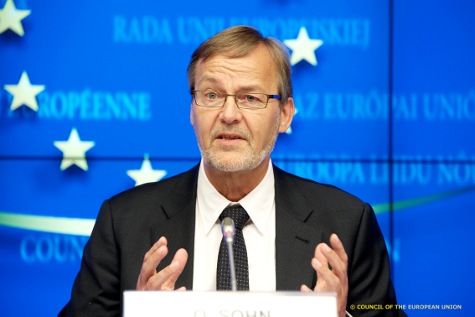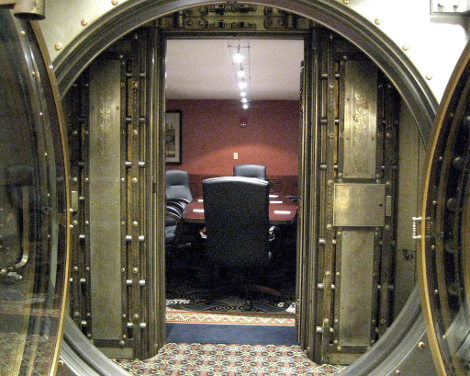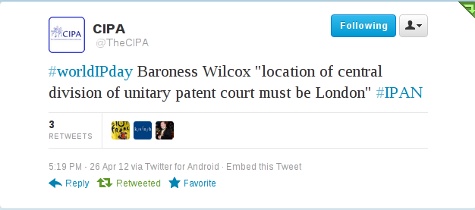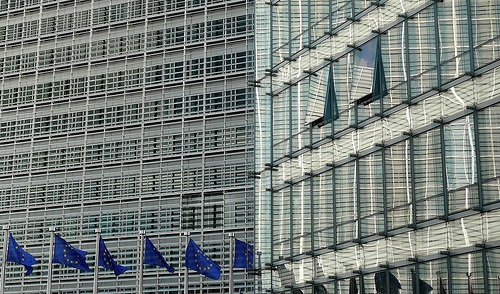
While some understand the 'Berlaymont' façade as symbol for a spirit of transparency, openness, and citizen involvement of EU policy making, others only recognise a good business for window wipers.
The epic and painful process of drafting and implementing a unified European patent infrastructure, which got stuck again on the latest Competitiveness Council meeting of 31 May/1 June 2012 (see our reports here and here as well as further coverage [1], [2]) discloses frightening mechanisms and structural deficiencies of the European policy-making process that may endanger stability and acceptance of and confidence in the European Union as a whole, particularly before the background of the current severe financial and depths crisis that shakes the Union like nothing else before.
Upon a closer look at the process, four major problems can be identified that prevent EU politicians to find a reasonable solution satisfying the needs of the European innovative economy:
- Ignorance as to users and experts and their mostly well-founded observations;
- A striking lack of transparency preventing public involvement;
- An information policy that disguises more than it discloses; and
- National egoisms, inappropriate horse-trading and power games.
Below I collect some striking examples of each of the above four phenomena.
Yesterday I had posted an article on the failure on the 3169th meeting of the Council of the EU in Competitiveness configuration (Internal Market, Industry, Research and Space) which was held in Brussels. As indicated, the final result was that the decision on the seat of the central division of the EU Unified Patent Court is said to be taken by the European Council at its meeting on June 28 and 29, 2012.
Well, the European Council should not be mixed up with the Council of the European Union.
The European Council consists of the Heads of State or Heads of Government of the Member States, together with its President and the President of the Commission. It defines the general political direction and priorities of the European Union. With the entry into force of the Treaty of Lisbon on 1 December 2009, it became an institution. Its President is Mr Herman Van Rompuy.
To the contrary, the Council of the European Union is the EU institution where the Member States’ government representatives sit, i.e. the ministers of each Member State with responsibility for a given area. The composition and frequency of Council meetings vary depending on the issues dealt with.
I must confess that due to some sloppiness in writing and in sake of brevity I frequently have labelled the Council of the European Union as “EU Council”, even in this blog. This is confusing. I should avoid this language in future.
So, after this preliminary digression it is now clear what will happen on June 28 and 29, 2012:
Ms Merkel and all of her colleagues on EU level are poised to undertake a (final?) approach to find a political solution to the question of the seat of the central division of the EU Unified Patent Court. Maybe that there is even a slim chance is that Spain and Italy (which now have changed their respective government since the failure of the EU Community Patent approach in 2010) jump on the bandwagon.
The German broadsheet Handelsblatt today runs a story indicating that on the 3169th meeting of the Council of the EU held yesterday the German delegation kept on fiercely fighting for Munich as seat for the central division but on the level of ministers no agreement could be reached.
In view of this situation it appears to be quite safe to say that the EU Unified Patent Court and, of course, the linterlinked enhanced co-operation for creating a EU Unitary Patent, will not only be dead with regard to the duration of current Danish EU Presidency (ending on July 01, 2012 anyway) but probably also for a much longer time should the EU Euro crisis rise to higher levels such that the Heads of State / Heads of Government to be assembled in Brussels later this month need to be busy with firefighting on a full-time basis, having no spare time to resolve Intellectual Property issues.
In the Handelsblatt story, unidentified EU Diplomats are cited to have said that a solution will probably be found as part of a “package”. This means that the country receiving the seat will be required to give in concerning some other compromise elsewhere. Or, the other way round: A country that is very generous elsewhere might expect to receive the seat of the central division on the basis of reciprocation. Hence, if the Euro crisis does not hamper the entire summit, Ms Merkel might have a chance to bring home the central division as some sort of a consolation gift if she gives in with regard to some of the pressing issues in the context of the current EU (Euro) crisis.
Furthermore, Handelsblatt explicitly writes that especially the Italian Government might be ready to join the club in a last minute move but was unable to do so yesterday because of they were unhappy with the state of the discussion on the seat issue. I can only hope that they do not carry on with nurturing pipe dreams of bringing the central division to Milan.
Obviously nobody on EU level is seriously negotiating any technical details of the patent package (Unitary Patent including translation agreement plus Unified Patent Court) any more. As said before, patent experts have been kicked out unceremoniously. If (and only if) an agreement on the seat issue is reached, the entire matter probably will be pressed on an as-is basis through the institutions anyway.
[UPDATE 2012-06-01] See also this report by Sophie Mosca on europolitics.info:
“Italy proposed, in February, its candidacy for the seat of the central division of the unitary patent court system as a way of breaking the stalemate. Although its proposal was initially rejected because it was presented after the deadline of 4 December 2011 for the submission of candidacies, it has come back to the fore. “The Netherlands did the same recently, stressing that it did not wish to make the situation worse, but to propose The Hague as a candidate in order to calm the debate,” an informed source told Europolitics.”
This means that the Italian Government indeed wants to cash in sort of a dividend on dropping Mr Berlusconi’s opt-out refusal to join the EU Community patent project in 2010. I am not amused.
Today, the 3169th Council meeting of the EU Council in Competitiveness configuration (Internal Market, Industry, Research and Space) was held in Brussels, chaired by Mr Ole Sohn, Minister for Business and Growth of Denmark. According to Document 10362/12, the Council
– held a preparatory debate in order to gather consensus on the location of the seat for establishing a unified patent court, with a view to a successful decision on the seat by the European Council at its meeting on 28-29 June 2012.
This means, of course, that once more no political solution was reached.
A few days ago, the Danish Presidency had circulated an important Document 10059/12 titled Draft Agreement on the creation of a Unified Patent Court – Suggested way forward for a political agreement which, however, – but no surprise – was not released to the public.
I have heard rumours from confidential sources that at the end of 2011 under the Polish EU Presidency some or all of the political actors dealing with the EU Unitary Patent / EU Unified Patent Court matter decided to drop all expert advice from (internal) civil service experts (from the EU Commission and the delegations of the EU Member States present at the EU Council meetings) in order to force a breakthrough by some purely political decision on the seat of the central division of the Unified Patent Court. If this is true, this information might indeed be suitable to shed some light on the somewhat strange situation last December, when the announcement of the Polish Presidency communicated by Document 17539/11 to organise an initialling ceremony whereby the text of the Unitary Patent Court Agreement could be finalised in Warsaw on 22 December 2011 was eventually rescinded with no clear indication of what really had happened behind the scenes. The official line appeared to be that all problems but the seat of the central division are solved whereas other voices indicated that more substantial issues were still open. Probably the political staff had decided to ignore all opinions from the internal experts, concluding that the entire EU patent project is not suitable to generate a consensus in any foreseeable time amongst experts skilled in this field of law.
Ministers addressed the last outstanding issue in the draft agreement for the creation of a Unified Patent Court, with a view to finalising the “patent package” without delay.
The debate showed that further work was needed to reach consensus on the location of the Central Division of the Court of First instance for the future unitary patent jurisdiction.
At the time being it is not known to me as to what nature the further work was needed to reach consensus on the location of the Central Division of the Court of First instance is supposed to be.
Anti-Patent Campaigners put their trust in François Hollande as EU Council attends to Unitary Patent Court again

The newly elected President of France, François Hollande promising "change". Will he be the first anti-patent campaigner governing an EU state?
Now that François Hollande took office as the new President of France after his marginal victory in the French presidential elections this May, he will now introduce himself to official EU policy on his first Competitive Council meeting on May 31/June 1. The draft agenda for this meeting (cf. item 19), reading “Draft agreement on a Unified Patent Court and draft Statute – Political agreement“, electrifies observers of and parties involved the ongoing European patent legislation saga (see also press release, middle of page 5).
In recent months the upcoming French elections brought the negotiations on the Unified Patent Court Agreement to a complete standstill, as the dynamics between the French, British and German heads of govenment and the general political climate is a crucial factor in this legislative process, especially since the only serious and realistic candidates for the attractive seat of the new UPC Central Division are Paris, London, and Munich and it is frequently announced through official channels that this question is the only remaining open issue.
The EU Council expressed already in January this year its believe that a final agreement can be reached in June 2012 (see official statement) and it was the President of the European Council, Herman Van Rompuy, who clarified in a recent letter that he hopes (or expects) the remaining issues to be sorted out at next week’s Competitiveness meeting:
“[...] This deal is needed now, because this is an issue of crucial importance for innovation and growth. I very much hope that the last outstanding issue will be sorted out at the May Competitiveness Council. If not, I will take it up at the June European Council.”
But IP matters will not become easier in Europe with Mr Hollande, given his apparent openness to positions of critics of the current patent system. In fact, some of the answers (pdf) of Ms Fleur Pellerin (@fleurpellerin), responsible for the digital economy in Hollande’s campaign team, on a tendentious pre-election questionnaire of French anti software patent group “April” appear as if the socialist candidate for president (or his spokeswoman) was one of the ideological leaders of that pressure group:
The patentability of software would induce a partitioning of innovation that would be harmful to the ecosystem seen in its digital together. I am therefore opposed to the patenting of software.

The painting "Sonntag der Bergbauern" of Ernst Ludwig Kircher (1880-1938) is hanging above the cabinet table in the Berlin Office of the Federal Chancellor.
Recently, the Federal Ministry of Justice under Sabine Leutheuser-Schnarrenberger (Liberal Democrats/FDP, @sls_bmj) submitted a proposal for amendments to patent law and other laws of intellectual property (cf Draft Amendment, in German) that were approved this week by the Federal Cabinet. To enter into force, the Amendment still needs to be approved by the Federal Parliament (“Bundestag”) which, however, is only a formality given the present clear parliamentary majority.
The amendments to the Patent Act (Patentgesetz, PatG) aim at reducing bureaucracy and providing for more flexible and cost-efficient proceedings before the German Patent and Trademark Office (DPMA/GPTO), cf. press release (machine translation).
One important measure to improve cost- and procedural efficiency at least for the Office was the introduction of the electronic case file system ElSA which enables the GPTO to process patent and utility model files fully electronically. The present Amendment regulates inter alia the – long overdue – public access to the electronic ElSA files in order to provide for some cost- and procedural benefits to applicants and attorneys as well.
Until some fifteen years ago, it was common sense that internal proceedings of lawmakers in Government, Parliaments and Parliamentary Committees can’t be open to each and every interested individual of the general public: It was simply commercially infeasible to make photocopies of all relevant documents and send them out for free to everyone who would like to read them. Beyond the group of genuine members of such bodies there always has been a culture of establishing some sort of extended inner circle based on status and privilege where members thereof would receive prints of photocopies important papers via postal service. It was really a privilege to be part of such circles, and in the field of Intellectual Property legislation usually this status was reserved for dignitaries like Presidents of the Insitute of patent attorneys or the like.
At least in some fields commercial alternatives were available. I remember that in the 1980s I started an experiment on my own: Eager to learn about the inner workings of German politics, I subscribed to a relative small subset out of the full range of Official Printed Matters (Drucksachen) of the lower chamber of the German Parliament (Bundestag) covering legislative drafts and minutes of parliamentary debates in certain fields of politics I was interested in. Those Bundestags-Drucksachen were printed and distributed for a fee by a small publishing company Verlag Dr. Hans Heger located in Bonn. The monthly costs of this undertaking roughly amounted to the equivalent of a subscription to one of the major broadsheed daily newspapers like Frankfurter Allgemeine Zeitung (FAZ) or the like.
Hence, the postman started delivering piles of printed matters, and after a short while the floor of my living room was covered with a layer of unread parliamentary papers. Later I carried all that stuff down to the cellar, and some months onwards I had to pull the emergency brake and abandon the entire project because of all empty space was sucked off by piles of Official papers, most of them unread, of course. In the end, the experiment had utterly failed.
But then, suddenly the the Internet came in and was more and more accessible by private individuals.
Continue reading »
Yesterday, in Berlin the German industry association Bundesverband der Deutschen Industrie e.V. (BDI) has held a conference titled Tag des geistigen Eigentums – Geistiges Eigentum verpflichtet (Intellectual Property Day - Property entails obligations). According to a report published on Heise’s Newsticker the topic of the pending proposal for a Unitary Patent was discussed.
Reportedly Mr Christoph Ernst from German Ministry of Justice (Bundesjustizministerium) has re-affirmed his expectation that a conciliation on this matter can and will be reached until next meeting of the EU Competitiveness Council to be expected end of May or in June later this year.
Mr Lothar Steiling, Director Intellectual Property with Bayer AG and President of the VPP (German Association of Intellectual Property Experts), is reported to have supported the proposed enhanced co-operation to create a Unitary Patent on behalf of those circles of insustry which have decided not to oppose the pending draft contrary to the dismissive language used especially be EPLAW. Another supportive statement came from Mr Andreas Thürer, Director Intellectual Property with Bosch Rexroth.
Ms Kerstin Jorna from EU Commission DG Internal Market is said to have argued more cautiously, considering that the proposal still might fail. She explicitly appealed to the representatives of German Industries to come forward in support of the Unitary Patent.
Furthermore, statements of FFII as well as of representatives of the German Piratenpartei are said to have expressed their concerns especially that the Unitary Patent might turn out to be a tool to facilitate legal acceptance of software patents (patents on computer-implemented inventions CII).
Continue reading »
A couple of years ago, in 2007 the European Patent Office (EPO) was pleased to invite to its annual Online Services conference, which that year took place in the Lake Como area, Italy, on 13 and 14 November. The conference theme was ‘End-to-end electronic processing – how to survive when the EPO no longer accepts paper‘. In fact, within the broader context of the European Patent Network EPN, the EPO strived to modernise itself by announcond advanced electronic digital network superstructures.
The intention was to eliminate paperwork also with regard to communication to and from the applicants, that is, in many cases, their patent attorneys, well before the end of the decennium; see Barbara Cookson’s report here. A message on the EPO website (which, meanwhile, is long gone) said:
Continue reading »
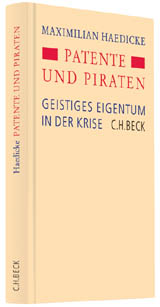 As already indicated in my earlier post, one of the mainstream topics of discussions in Germany concerning IP politicts is the stunning rise of the German Piratenpartei (Pirate Party) at least if recent polls can be trusted. As of April 18, 2012, a poll covering the entire territory of Germany attributes to the Piratenpartei a 13% share of the votes. This is remarkable, indeed. According to the same poll, the Greens could expect a 12% share of the votes and, hence, the Piratenpartei might well be called third-strongest political party in Germany. However, we should not forget that such polls usually have a substantial error margin and, hence, the reality might also be that the Greens have 14% and the Piratenpartei merely 11% of the votes. In any case, at least at the time being, the Piratenpartei appear to be well avove 10% and, of course, well ahead of the 5% quorum required to get seats in general elections.
As already indicated in my earlier post, one of the mainstream topics of discussions in Germany concerning IP politicts is the stunning rise of the German Piratenpartei (Pirate Party) at least if recent polls can be trusted. As of April 18, 2012, a poll covering the entire territory of Germany attributes to the Piratenpartei a 13% share of the votes. This is remarkable, indeed. According to the same poll, the Greens could expect a 12% share of the votes and, hence, the Piratenpartei might well be called third-strongest political party in Germany. However, we should not forget that such polls usually have a substantial error margin and, hence, the reality might also be that the Greens have 14% and the Piratenpartei merely 11% of the votes. In any case, at least at the time being, the Piratenpartei appear to be well avove 10% and, of course, well ahead of the 5% quorum required to get seats in general elections.
In view of this situation we can see an increasing level of nervousness – if not outright panickiness – amongst other political parties which are feverishly considering all available options of how to cope with this new political force. It is entirely open to what end this development will lead. Some parties, in particular the Greens, might be mulling to inch towards Pirate positions in order ro regain ground in circles of younger citizens while others surely will prefer to fight agsinst the very tendencies embodied by the Piratenpartei. In this context and speaking to an audience of IP specialists living abroad I would also like to point out that the current political discussion of the Piratenpartei can by no means be reduced to issues related to IP rights. There are other topics, for example in the fields of welfare politics or related to defending civil rights which are of great importance domestically.
Continue reading »
The Pirate Party (“Piratenpartei” in Germany) is well known amongst IP professionals for their sceptic stance on the current state of copyright and patent law. This article is just to keep our readers overseas without regular access to domestic news from Germany informed on recent developments:
- On September 18, 2011, the Piratenpartei won 9% of the votes and got their first parliamentary group in a local state Parliament in Germany; see my earlier posting here.
- On January 26, 2012, the Parliament (Landtag) of the German State of Saarland took a decision to dissolve after the Saarland Government, a so-called Jamaika-Coalition made up of Christian Democratic Union (CDU), Liberal Democratic Party (FDP), and the Greens (Bündnis90/Die Grünen), failed to carry on due to severe internal disputes. Yesterday, on March 25, 2012, the Piratenpartei won off the cuff a whopping share of 7.4% of the votes, well above the 5% quorum, giving them seats in the new legislative period. Remarkably, the parliamentary group of the Liberal Democrats was extinguished by a crushing defeat materialising in a share of meagre 1.25% of the votes.
- In the German State of Schleswig-Holstein, the Constitutional Court objected to certain provisions of the electoral law, demanding amendments to the law and, subsequently, dissolving of the Parliament (Landtag). A General Election is due to be held on May 06, 2012. Recent polls dated March 16, 2012, show results around 5% to be expected for the Piratenpartei. The quorum for gaining seats will be 5%.
- On March 14, 2012, the Parliament (Landtag) of the German State of North-Rhine-Westphalia dissolved after the Social Democrat (SPD) minority Government was defeated in a vote on the budget. A General Election is scheduled to be held on May 13, 2012. Recent polls also show results around 5% to be expected for the Piratenpartei.The quorum for gaining seats will be 5%.
- On January 20, 2013, General Elections will be held for the Parliament (Landtag) of the German State of Lower Saxony. Current polls attribute to the Piratenpartei a share of about 4%. The quorum for gaining seats will be 5%.
- In September 2013, General Elections for the lower chamber of German Parliament (Bundestag) fall due. Recent polls show results around 6% to 7% to be expected for the Piratenpartei. The quorum for gaining seats will be 5%.
Last not least in view of euphoric feelings after the Pirate Party’s success in Saarland, probably creating a thrust of motivation amongst their party activists, I would be somewhat surprised if they don’t also make it into the Parliaments of Schleswig-Holstein and North Rhine-Westphalia later this spring. And afterwards, if they manage to avoid any severe PR-disaster having a potential to turn their party into a laughing stock, it is also likely to see them in the Parliament of Lower Saxony as well as in the Bundestag in Berlin next year. As there are literally thousands of newcomer volunteers lining up at party conferences and looking for participation it might prove a bit difficult for the party to make sure that no lunatics or polit trolls seize the floor for performing a show of their own.
Anyway, pepole involved in IP politics better should assume that Piratenpartei is likely to stay.
(Photo: (C) 2012 CC-BY Piratenpartei @Fek)
The k/s/n/h::law blog
Some of the patent attorneys of the KSNH law firm have joined their efforts to research what is going on in the various branches of IP law and practice in order to keep themselves, their clients as well as interested circles of the public up to date. This blog is intended to present results of such efforts to a wider public.
Blog Archives
- November 2013 (2)
- October 2013 (1)
- September 2013 (1)
- August 2013 (2)
- July 2013 (3)
- June 2013 (5)
- March 2013 (5)
- February 2013 (4)
- January 2013 (5)
- December 2012 (5)
- November 2012 (5)
- July 2012 (5)
- June 2012 (8)
- May 2012 (5)
- April 2012 (3)
- March 2012 (4)
- February 2012 (5)
- January 2012 (6)
- December 2011 (12)
- November 2011 (9)
- October 2011 (9)
- September 2011 (4)
- August 2011 (7)
- July 2011 (4)
- June 2011 (1)
Blog Categories
- business methods (6)
- EPC (7)
- EPO (12)
- EU law (92)
- ACTA (8)
- CJEU (4)
- Comitology (1)
- competition law (2)
- Enforcement (6)
- EU Unified Patent Court (62)
- FTA India (1)
- TFEU (2)
- Trade Marks (5)
- European Patent Law (37)
- German Patent ACt (PatG) (1)
- German patent law (5)
- Germany (6)
- Pirate Party (3)
- International Patent Law (4)
- PCT (2)
- IP politics (10)
- licenses (2)
- Litigation (5)
- Patentability (7)
- Patents (12)
- Piratenpartei (2)
- Software inventions (10)
- Uncategorized (9)
- Unitary Patent (24)
- US Patent Law (4)
Comments
- kelle on Germany: Copyright Protection More Easily Available For Works Of “Applied Arts”
- Time Limits & Deadlines in Draft UPCA RoP: Counting The Days - KSNH Law - Intangible.Me on Wiki Edition of Agreement on Unified Patent Court Agreement (UPCA)
- Time Limits & Deadlines in Draft UPCA RoP: Counting The Days | ksnh::law on Wiki Edition of Agreement on Unified Patent Court Agreement (UPCA)
- Wiki Edition of Agreement on Unified Patent Cou... on Wiki Edition of Agreement on Unified Patent Court Agreement (UPCA)
- European Commission Takes Next Step Towards Legalising Software Patents in Europe | Techrights on EU Commission publishes Proposal of amendend Brussels I Regulation for ensuring Enforcement of UPC Judgements
Blogroll
- 12:01 Tuesday
- America-Israel Patent Law
- Anticipate This!
- AwakenIP
- BlawgIT
- BLOG@IPJUR.COM
- BP/G Radio Intellectual Property Podcast
- Broken Symmetry
- Class 46
- Director's Forum: David Kappos' Public Blog
- Gray on Claims
- I/P UPDATES
- IAM Magazine Blog
- Intellectual Property Intelligence Blog
- IP Asset Maximizer Blog
- IP CloseUp
- IP Dragon
- IP Watch
- IP Watchdog
- IPBIZ
- ipeg
- IPKat
- ITC 337 Law Blog
- Just a Patent Examiner
- K's Law
- MISSION INTANGIBLE
- Patent Baristas
- Patent Circle
- Patent Docs
- Patently Rubbish
- PatentlyO
- Patents Post-Grant
- Reexamination Alert
- SPICY IP
- Tangible IP
- The 271 Patent Blog
- The Intangible Economy
- THE INVENT BLOG®
- Think IP Strategy
- Tufty the Cat
- Visae Patentes
The KSNH blogging landscape


This blog and the German-language sister blog k/s/n/h::jur link to the two popular and privately run blogs IPJur und VisaePatentes and continue their work and mission with a widened scope and under the aegis of our IP law firm.
ksnhlaw on Twitter
- No public Twitter messages.
 KSNH::JUR Feed (german)
KSNH::JUR Feed (german)- Ist Verschlüsselung passé? September 6, 2013Auf verschiedenen Feldern beruflicher Praxis ist dafür zu sorgen, dass Kommunikation vertraulich bleibt. Die trifft beispielsweise für Ärzte zu, aber auch für Anwälte, darunter auch Patentanwälte. Einer der zahlreichen Aspekte, die in diesem Zusammenhang eine Rolle spielen, ist die Technik, um die Vertraulichkeit beruflicher Kommunikation sicherzustellen. Wa […]
- EU-Einheitspatent: Demonstrativer Optimismus und Zahlenmystik allerorten – Naivität oder politische Beeinflussung? June 26, 2013Nach mehreren vergeblichen Anläufen zur Schaffung eines EU-weiten Patentsystems wurde 1973 als Kompromiss das Europäische Patentübereinkommen unterzeichnet, welches unabhängig von der seinerzeit noch EWG genannten Europäischen Union System zur zentralisierten Patenterteilung mit nachgeordnetem Einspruchsverfahren durch das Europäische Patentamt schuf. Wie wi […]
- Moderne Zeiten oder: DPMA und Patentgericht streiten über die elektronische Akte April 25, 2013Bekanntlich hat das Deutsche Patent- und Markenamt (DPMA) im Jahre 2013 mit der rein technischen Fertigstellung der Einrichtungen zur elektronischen Akteneinsicht einen wichtigen Meilenstein seines Überganges von der Papierakte zur “elektronischen Akte” erreicht. Im DPMA werden aber bereits seit dem 01. Juni 2011 Patente, Gebrauchsmuster, Topografien und erg […]
- Gutachten zu Forschung, Innovation und technologischer Leistungsfähigkeit Deutschlands 2013 March 11, 2013Unter dem Datum vom 28. Februar 2013 ist die Bundestags-Drucksache 17/12611 veröffentlicht worden Sie trägt den Titel Unterrichtung durch die Bundesregierung - Gutachten zu Forschung, Innovation und technologischer Leistungsfähigkeit Deutschlands 2013. Die Bundesregierung legt dem Deutschen Bundestag seit dem Jahr 2008 […]
- 3D-Printing: Zum Filesharing von 3D-Modelldaten February 25, 2013In meiner kleinen zuvor angekündigten Reihe über rechtliche Aspekte des 3D Printing komme ich heute auf die Frage zu sprechen, ob die Hersteller von Gerätschaften es hinnehmen müssen, wenn Ersatztreile davon – vom Brillengestell über Smartphone-Gehäuseteile bis hin zu Rastenmähermotor-Abdeckungen – gescannt und die daraus […]
- Ist Verschlüsselung passé? September 6, 2013

